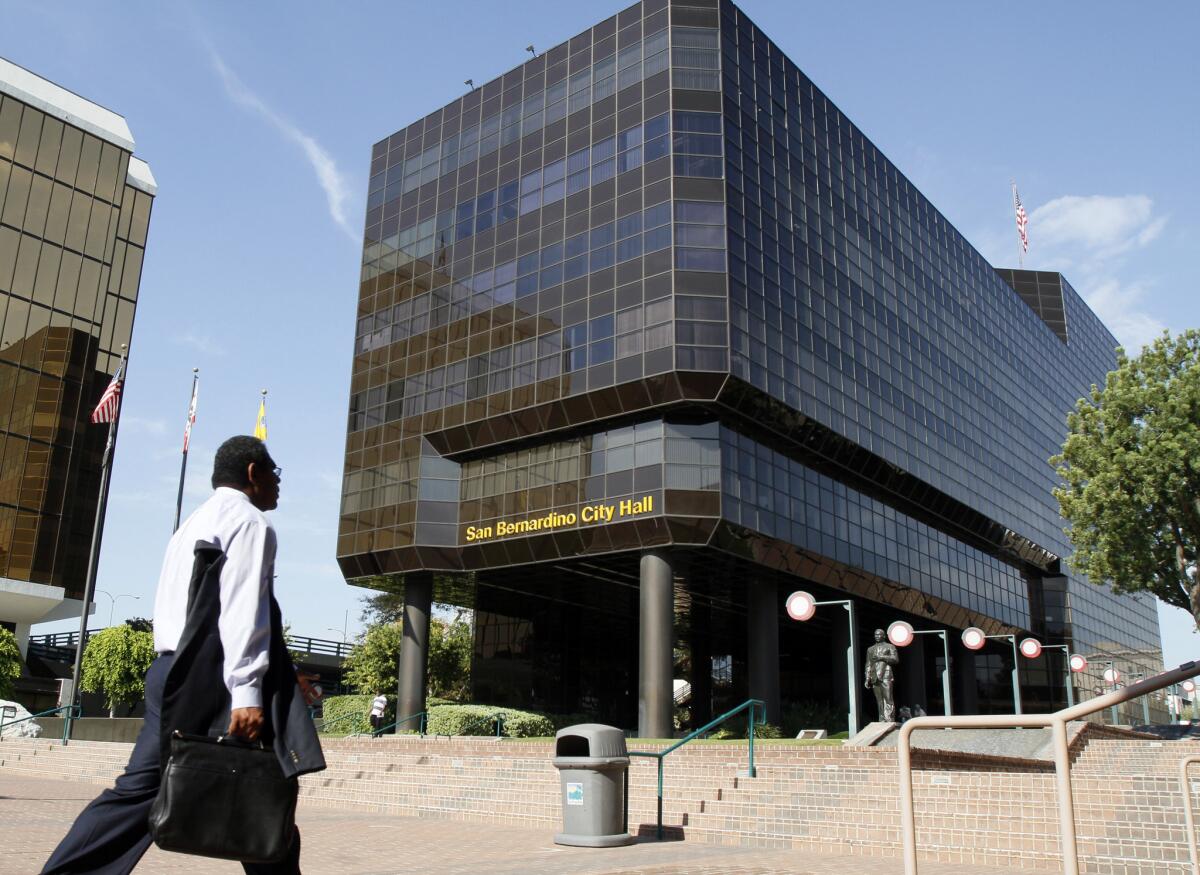San Bernardino voters oust city attorney, councilwoman in recall

- Share via
In a city that had fallen into bankruptcy, where confidence had plummeted as crime rose, the election was cast as a decisive moment for San Bernardino.
And Tuesday the voters spoke up, pushing out the longtime city attorney — a prominent figure first elected to the job in 1987 — and a city councilwoman who nonetheless emerged as the leading vote-getter in the race for mayor.
Proponents of the recall effort hailed the election as a victory.
“It gives San Bernardino hope that things can get better and will get better,” said Scott Beard, a leader of the recall effort. “We are going to have wholesale change in our city.”
In an off-year election, voters across California also decided on initiatives dealing with a host of issues. Voters in Stockton, another bankrupt and crime-ridden city, endorsed a sales tax that would increase revenue to bolster the city’s public safety operations. In Sunnyvale, voters approved gun restrictions that would put the relatively safe city at the forefront of a nationwide conversation on firearms regulation.
In San Bernardino, where 10 people were running for mayor, top finisher Councilwoman Wendy McCammack heads to a February runoff with Carey Davis, a political newcomer and accountant who climbed to prominence in the election, particularly after he was endorsed by the local newspaper.
“That’s very encouraging,” Davis said of the results, “to be looking at a new set of players, players who’ll bring some freshness and some vibrancy.” He added that he hoped it would change the atmosphere of the city, making it more appealing to businesses that might consider coming to San Bernardino.
McCammack lost the seat she’d held for 13 years while advancing in her bid to lead the city. It was a challenge, she said, essentially running two simultaneous campaigns, especially as five candidates stepped forward to run for her council seat.
So she focused on becoming mayor. As a longtime resident and business owner, McCammack said she saw the fate of her livelihood intertwined with that of her city.
Beard said McCammack’s recall showed that she had lost the support of her own district.
“The people who knew her the best threw out of her office,” he said, adding that as one of the longest-serving council members, “she has culpability in what happened to the city.”
McCammack maintained that she had long been a voice of opposition on the council, advocating a tough “clear-and-cut” approach to spending that, she contends, would have spared the city from bankruptcy.
“Because I’ve been on the council for 13 years, is it my fault? Emphatically, the answer is no,” she said. “It’s just the opposite. I’ve been the most outspoken naysayer.”
In addition to the mayor’s race, nearly 60% of voters supported the recall of City Atty. James Penman, according to the unofficial election results. Gary Saenz won 56% of the vote to replace him.
The other San Bernardino councilman targeted in the recall, John Valdivia, held onto his seat, with 62% of voters in his district rejecting the recall. In the two other council races, the incumbents — Virginia Marquez and Fred Shorett — held their seats.
Robert Jenkins — a councilman charged with more than 30 felony and misdemeanor counts related to allegedly posting ads on Craigslist for sex partners and directing them to a former partner and another man — also lost his seat. He fell to Benito Barrios, who received 55% of the vote.
Elsewhere, voters in the Santa Clara County city of Sunnyvale overwhelmingly backed a strict gun safety measure.
It would require residents to report lost or stolen weapons within 48 hours of the discovery and to keep weapons safely stored. It would also make it illegal to possess ammunition magazines of 10 or more rounds, and require those purchasing ammunition to provide documentation that would be kept on file by store owners for two years.
In Stockton, voters agreed to increase the sales tax by three-fourths of a cent on the dollar — raising $280 million over the next 10 years to hire more police officers, support anti-crime programs and pay down debt.
Opponents argued that the city had been battered by incompetence and poor financial decisions, and were reluctant to give them more money. But proponents said that the tax increase was essentially the only option left.
“We’re all breathing a little easier,” Stockton Councilman Michael Tubbs said. “This city came together and was willing to sacrifice so we can say ‘OK, tomorrow is going to be better.’”
Voters in Palo Alto, where real estate prices have soared, defeated a proposal to build affordable housing for senior citizens. It would have rezoned a 60-unit apartment complex for seniors making 30% to 60% of the region’s median income.
The project — approved by the City Council in June — would have included a dozen single-family homes to help pay for the apartments, but opponents argued that the development was too dense for the city.
Times staff writers Gale Holland in Los Angeles and Diana Marcum in Fresno contributed to this report.
More to Read
Sign up for Essential California
The most important California stories and recommendations in your inbox every morning.
You may occasionally receive promotional content from the Los Angeles Times.











